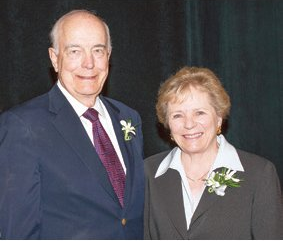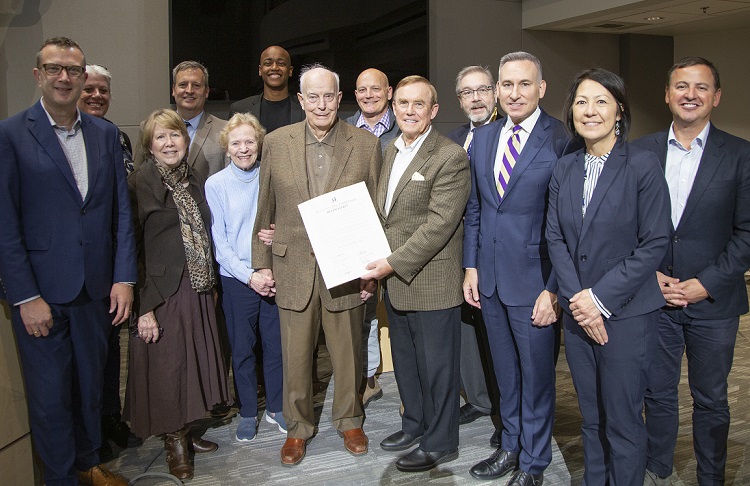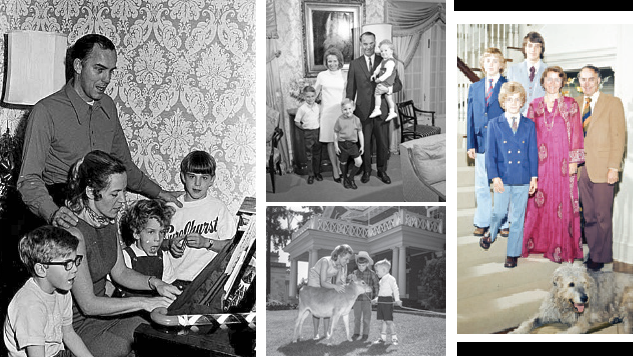Serving Without Limits: Dan and Nancy Evans
October 23, 2023 at 1:56 p.m. | Updated September 24, 2024 at 1:31 p.m.
EDITOR'S NOTE:
Late last week, just a month shy of his 99th birthday, former Governor and Senator Dan Evans died at home. Dan Evans is recognized for his lifetime of service to the State of Washington.
In his honor, Northwest Prime Time republishes a cover article we ran in November 2014 that celebrated both his and his wife's lives. Nancy Evans died in January of this year.
 Dan and Nancy Evans
Dan and Nancy Evans
January 2025 would have marked 60 years since Dan Evans took office as Governor of the State of Washington. He and his wife Nancy Bell Evans remained active and were known to roll up their sleeves to help where they could, whether serving on advisory boards including the University of Washington’s Evans School of Public Affairs, voicing opinions in guest editorials or lending a hand to those in need.
In 2013, the couple was recognized with a volunteer award from the YMCA of Greater Seattle. Addressing the impact of their service, the YMCA noted: “Dan and Nancy Evans have more than 100 years of combined service to our community, our nation and the world. The passion they brought to public service in Washington state when they were governor and first lady is as vibrant as ever today.”
 Last year, Councilmembers Pete von Reichbauer, Jeanne Kohl-Welles, their colleagues and Executive Constantine attended a special recognition honoring the work of former WA Governor and U.S. Senator Dan Evans, alongside his wife, Nancy, at a ceremony at the King County Courthouse
Last year, Councilmembers Pete von Reichbauer, Jeanne Kohl-Welles, their colleagues and Executive Constantine attended a special recognition honoring the work of former WA Governor and U.S. Senator Dan Evans, alongside his wife, Nancy, at a ceremony at the King County Courthouse
Daniel J. Evans and Nancy Bell Evans
Dan and Nancy Evans have devoted more than half a century to public service, in and out of political office, with a level of commitment matched by few of their fellow citizens.
As a three-term governor of Washington and later United States senator, Dan Evans earned the nickname “Straight Arrow.” He was so widely admired and his administration so untouched by scandal that a prominent columnist once joked he was “no fun.” Nancy Evans has served on the boards of innumerable educational and nonprofit organizations, including Whitman College, her alma mater. The Evanses are known for the heft of their Rolodex and their willingness to tap into it in support of various good causes. Together they personify the term “power couple” in Washington state.
Deep Roots
Both Daniel J. Evans (born in Seattle in 1925) and Nancy Bell Evans (born in Spokane in 1933) have deep roots in the Northwest. Evans’ great-grandfather settled in Port Gamble in 1859. His maternal grandfather represented Spokane in the Washington State Senate in 1893. His father once served as King County Engineer. Nancy Bell’s father, a mining engineer and native New Yorker, settled in Spokane after a stop in Vancouver, British Columbia. Both had politically active, civic-minded parents. Nancy once said that one of the lessons of her Depression-era childhood was that even if you didn’t have much money, you could donate your time.
Evans put his toe into politics for the first time in 1942, when he ran for junior class president at Roosevelt High School. He lost. It was the last election he would ever lose. He earned a master’s degree in civil engineering at the University of Washington in 1949 and joined the City of Seattle’s structural engineering design team. He served in the Navy during World War II and the Korean War. He opened a private practice as an engineer in 1953.
Evans’ political career began in 1956 when he was elected to the Washington State House of Representatives, a Republican in a predominately Democratic state government. He campaigned on a platform that called for better roads, bridges and “metropolitan planning.” Quiet and unassuming, he showed an early knack for forming bipartisan coalitions, a characteristic that would mark his entire tenure in politics. His fellow legislators voted him outstanding freshman. He was later elected GOP minority floor leader.
Meanwhile, Nancy Bell was studying music at Whitman College in Walla Walla. She graduated with a Bachelor of Arts degree in music in 1954 and did graduate work at Eastern Washington University in Cheney before becoming a music teacher and librarian in the Shoreline School District near Seattle. She met Dan during a ski trip arranged by mutual friends. The Spokane girl and the Seattle boy married in 1959.
Three-Term Governor
 Governor Evans as he climbs Mount
Governor Evans as he climbs MountRainier, 1965 – he is one of the few
governors to stand atop Washington’s
most iconic peak
In November 1964, Evans defeated incumbent Governor Albert D. Rosellini, one of the few Republicans elected during a Democratic landslide led by President Lyndon Johnson. At 39, he was the youngest governor in state history. He would go on to become the only one (until 2020 when Jay Inslee matched that record) to serve three consecutive terms. (He won his third term, in 1972, by defeating Rosellini once again, in the latter’s final attempt at a political comeback.)
Evans set the tone for his administration in his first inaugural address when he declared, “This administration is not ashamed of the word conservative and it is not afraid of the word liberal” (The Seattle Times, 1993). Like Teddy Roosevelt, one of his political heroes, he frequently crossed party lines. He once said he would “rather cross the aisle than cross the people,” adding that there are “no Republican schools or Democrat highways, no liberal salmon or conservative parks" (The Seattle Times, 2002).
As governor, he pursued an agenda that has often been described as “passionately moderate.” He championed the cause of education, working with the 1967 Legislature to create the state community college system, launch Evergreen State College and provide higher levels of support for four-year colleges and universities. He used his executive authority to establish the State Indian Affairs Commission in 1967 and the State Women’s Council in 1971. He pushed for tax reform, supporting unpopular (and ultimately unsuccessful) efforts to implement a state income tax in 1970 and 1973. He was a strong proponent of legislation to clean up the state’s air and water, restore areas damaged by strip mining, limit development of oil ports in the Strait of Juan de Fuca and protect endangered species. During his administration Washington became the first state to create a Department of Ecology (in 1970) and the first to adopt a coastal management program (in 1976).

The Evans children grew up in the Governor's Mansion during their father's three terms in office. Nancy Evans is seen (lower center) with two children and a calf. As First Lady, she helped oversee restoration of the mansion.
Evans held office during one of the more challenging periods in state history. The Boeing Company, then the largest employer in the Puget Sound region, lost several important defense contracts in the late 1960s, triggering what became known as the “Boeing Bust.” The unemployment rate rose to nearly 14 percent. Meanwhile, frustrations over the Vietnam War, civil rights, poverty and other social issues occasionally boiled over into urban riots. Protest became almost a way of life on college campuses.
A self-described “contrarian,” Evans steered an independent course through those tumultuous times. He responded to a series of demonstrations by black students in 1969 by appointing the first African Americans to the boards of the Seattle Community College and the University of Washington, despite warnings that he was risking political capital by “giving in” to the demands of protestors. He offended some of his constituents by endorsing the legalization of abortion and he dismayed others with his enthusiasm for nuclear power.
When California Governor Jerry Brown said he didn’t want any Vietnamese refugees in his state, fearing they would take jobs away from Californians, Evans invited them to come to Washington. He and Nancy personally greeted the first group of refugees to arrive. Among them were Chuong Huu Nguyen, his pregnant wife, Xuan Hoa Pham, and their five children. The Nguyens were so touched by the gesture that when their son was born a few months later, they named him Evans. When Evans Nguyen graduated from the University of Washington in 1998, former Governor Evans was in the audience to cheer him on.
During his 1972 reelection campaign, Evans also promoted five ballot measures to support a plan he called “Washington Futures.” Four passed. Referendum 27 improved residential, industrial and irrigation water systems. Referendum 28 financed the development of existing recreational properties and the acquisition of new ones. Referendum 29 expanded public health and rehabilitation facilities. Referendum 31 funded construction at the state's community colleges. The only measure that did not pass – Referendum 30 – would have improved public transportation.
As First Lady of Washington, Nancy Evans helped oversee the restoration of the Governor’s Mansion and the creation of the Governor’s Mansion Foundation. She also served as a trustee of the Patrons of South Sound Cultural Activities and the State Capitol Museum and was co-founding director of the Governor's Festival of the Arts – all this in addition to raising three young sons.
Head Geoduck
By the late 1960s, Dan Evans was attracting national attention. He was the keynote speaker at the 1968 Republican National convention; chaired the National Governors Conference in 1974; and both Richard Nixon in 1968 and Gerald Ford in 1976 considered him as a vice presidential running mate. Nevertheless, in 1977 Evans left politics to take on what many thought was a doubtful assignment, as president of the fledgling Evergreen State College in Olympia.
Evans had long had a soft spot for Evergreen. An innovative four-year college which opened its doors in 1971, Evergreen emphasized collaborative learning and interdisciplinary studies. Students designed their own academic programs. They received narrative evaluations instead of grades. They called themselves Geoducks, adopted “Let It All Hang Out” as a school motto, and articulated their values in “The Evergreen Social Contract -- A Guide for Civility and Individual Freedom.”
However, neither Evans’ successor as governor, Dixy Lee Ray, nor the Legislature shared his fondness for the school. Ray tried to close it in 1981, and conservative legislators tried to do the same in 1983. Evans helped fend off both efforts. He played a key role in stabilizing the institution and improving its reputation both within the state and nationally. By the time he left, in late 1983, Evergreen was a fixture on various lists of the best liberal arts schools in the West.
While at Evergreen, Governor John Spellman appointed Evans to the Northwest Power Planning Council. The council, created by Congress to plan for the future of the Bonneville Power Administration, was charged with preparing a regional energy conservation plan and determining how to mitigate the losses of fisheries due to BPA's dams. At the first meeting in April 1981, the council elected Evans its chair.
Senator Evans
Evans' work with the council was cut short in September 1983, when he was appointed to fill the Senate vacancy created by the death of Henry M. Jackson. Two months later, he won a special election to complete the remaining five years of Jackson’s term. He was assigned to two important committees in the Senate – Energy and Natural Resources and Foreign Relations – and he also served as vice chair of the Select Committee on Indian Affairs. But as a former governor and university president who was used to decisive action, Evans found the Senate more frustrating than rewarding. He complained about the lack of real debate, the influence of special interest groups, the venomous infighting and the need for incessant campaigning. Senators no longer engaged in meaningful debate, he said, but merely delivered set speeches to a largely empty chamber; and committee meetings were often stalled by lack of a quorum.
In October 1987, he announced that he would not be a candidate for re-election. He told one interviewer that he had come to the Senate too late (at age 63) to build up enough seniority to have any real influence. But he was also deeply disappointed with the institution itself. In a lengthy article for The New York Times, he said he had come to Washington with romantic ideas about “the duel of debate, the exchange of ideas,” and had found instead “a legislative body that had lost its focus and was in danger of losing its soul.” Senators were quick to speak out on issues but slow to listen to each other or agree to compromise. “I have lived through five years of bickering and protracted paralysis,” he wrote. “Five years is enough. I just can’t face another six years of frustrating gridlock.”
Home Again
After a brief stint at Harvard's Institute of Politics, Evans returned to Seattle in 1989. He never held elective office again, although he freely shared his political viewpoints. He continues to write articles and speak out on issues that concern him, from global warming to Indian treaty rights to the “nasty partisanship” that he thinks characterizes politics today. In 1993, he put on yet another hat, when then-Governor Lowry appointed him to the University of Washington’s Board of Regents.
Both Dan and Nancy Evans have maintained daunting schedules during their “retirement” years. Evans has been involved with more than two dozen organizations of one kind or another. Nancy Evans has served on the boards of Whitman College, the Seattle Symphony, and public television station KCTS among others. The couple's long years of community service have earned them a veritable bushel of awards and honors, including a Legacy Award from the Rainier Institute in 2004 and the A.K. Guy Award from the Greater Seattle YMCA in 2013. The University of Washington has memorialized their names through the Daniel J. Evans School of Public Affairs, which includes the Nancy Bell Evans Center on Nonprofits and Philanthropy.

Dan Evans autobiography was published in 2022
Here is a link to an article by Knute Berger complete with many personal reflections that appeared today on the CascadePBS news site (formerly Crosscut.com): https://www.cascadepbs.org/news/2024/09/remembering-popular-progressive-wa-republican-gov-dan-evans
Northwest Prime Time’s 2014 article was updated by the author from an article originally published in 2004 on www.HistoryLink.org, the online encyclopedia of Washington State History.





